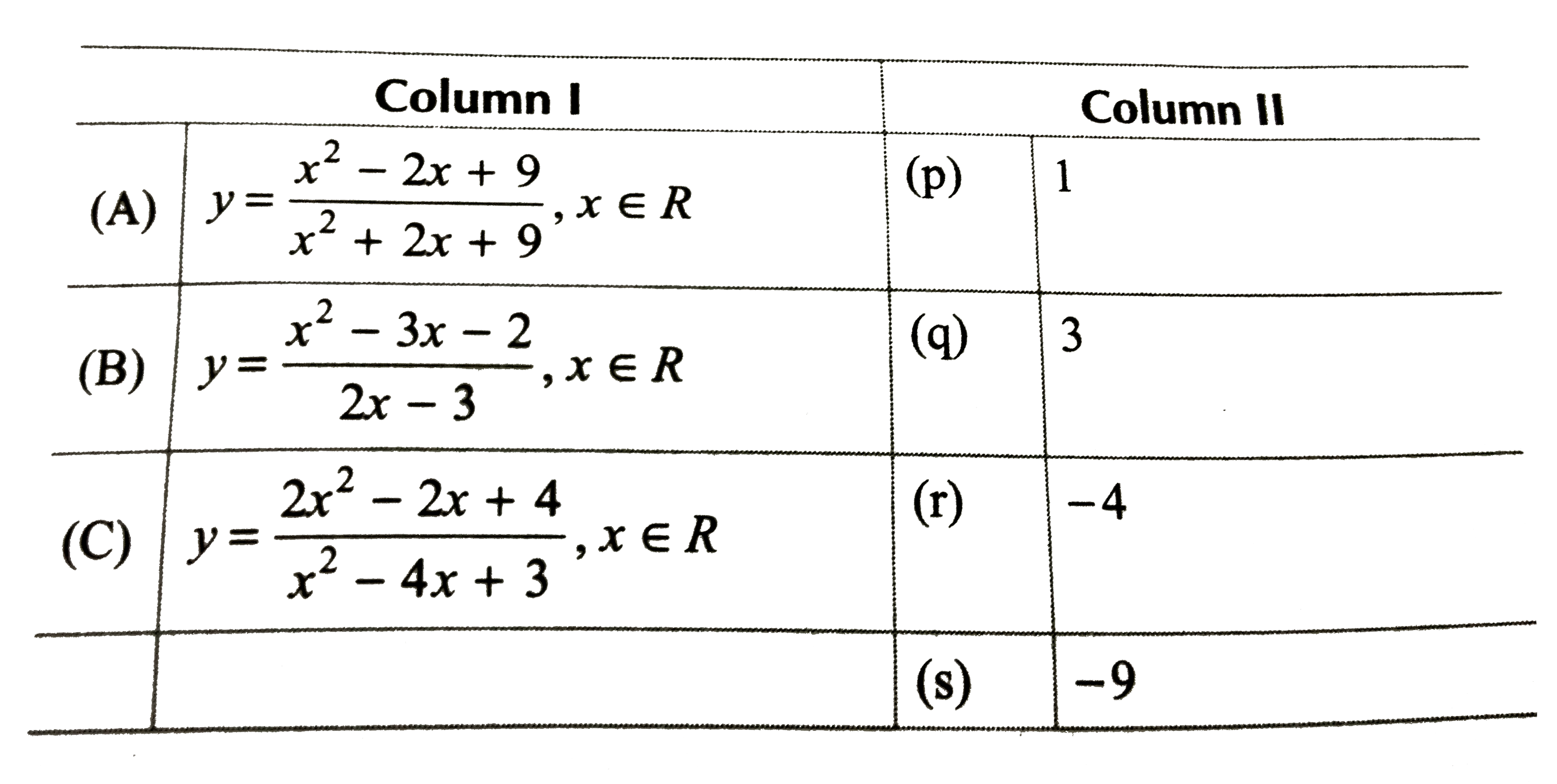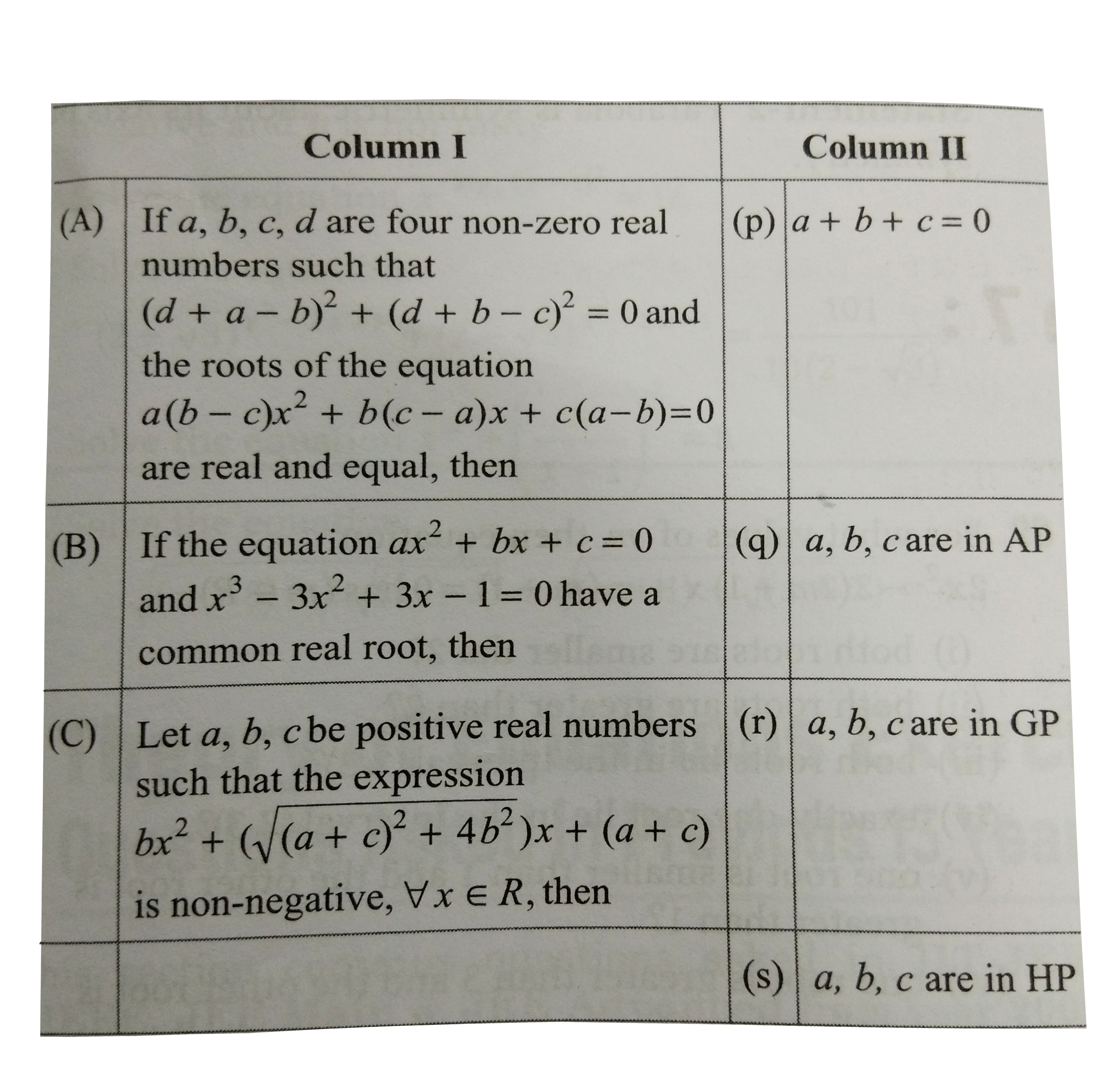Let a,b,c,d be distinct real numbers and a and b are the roots of the quadratic equation x2−2cx−5d=0 . If c and d are the roots of the quadratic equation x2−2ax−5b=0 then find the numerical value of a+b+c+d.Solution in Punjabi
The correct Answer is:3
a+b=2c.i
ab=−5x..ii
c+d=2a……iii
cd=5b.(iv)
From Eqs (i) and (iii) we get
a+b+c+d=2(a+c)
∴a+c=b+d………….v
From Eqs (i) and (iii) we get
b−d=3(c−a) …………vi
Also a is a root of x2−2cx−5d=0
∴a2−2ac−5d=0.......vii
As c is a root of
c2−2ac−5b=0....viii
From eqs vii and viii we get
a2−c2−5(d−b)=0
⇒(a+c)(a−c)+5(b−d)=0
⇒(a+c)(a−c)+15(c−a)=0 [ from Eq. (vi)]
⇒(a−c)(a+c−15)=0
∴a+c=15,a−c≠0
From Eq. (v) we get b+d=15
∴a+b+c+d=a+c+b+d=15+15=30
⇒ Sum of digits of a+b∣c+d=3+0=3
Topper's Solved these Questions
- THEORY OF EQUATIONSBOOK - ARIHANT MATHSCHAPTER - THEORY OF EQUATIONSEXERCISE - Exercise (Matching Type Questions)
2 Videos
- THEORY OF EQUATIONSBOOK - ARIHANT MATHSCHAPTER - THEORY OF EQUATIONSEXERCISE - MATCH TYPE
2 Videos
- THEORY OF EQUATIONSBOOK - ARIHANT MATHSCHAPTER - THEORY OF EQUATIONSEXERCISE - Exercise (Passage Based Questions)
21 Videos
- THE STRAIGHT LINESBOOK - ARIHANT MATHSCHAPTER - THE STRAIGHT LINESEXERCISE - The Straight Lines Exercise 8 : (Questions Asked in Previous 13 years Exams)
1 Videos
- THREE DIMENSIONAL COORDINATE SYSTEMBOOK - ARIHANT MATHSCHAPTER - THREE DIMENSIONAL COORDINATE SYSTEMEXERCISE - Three Dimensional Coordinate System Exercise 12 : Question Asked in Previous Years Exam
2 Videos
Similar Questions
Column I contain rational algebraic expressions and ColumnII contains possible integers which lie in their range. Match the entries of Column I with one or more entries of the elements of Column II.

View Solution
View SolutionIf G and L are the greatest and least values of the expression2x2−3x+22x2+3x+2,xεR respectively.
The least value of G100+L100 is
View SolutionSolve the following system of inequalities graphically
x+5y≤25,2x+2y≥2,2x−2y≤0,x≥0,y≥0
View SolutionConsider the line L1:x−12=y−1=z+31,L2:x−41=y+31=z+32 find the angle between them.
View SolutionConsider the equation (a+c-b)x^(2)+2cx+(b+c-a)=0 where a b,c are distinct real number.suppose that both the roots of the equation are rational then
View SolutionIn quadratic equation ax2+bx+c=0, if discriminant D=b2−4ac, then roots of quadratic equation are:
View SolutionIf the roots of the quadratic equation (b−c)x2+(c−a)x+(a−b)=0 are real and equal then prove that 2b=a+c.
View SolutionIf a,b,c,d∈R−{0} , such that a,b are the roots of equation x2+cx+d=0 and c,d are the roots of equation x2+ax+b=0, then |a|+|b|+|c|+|d| is equal to
View SolutionSuppose a,b,c,d∈Rand2ac=b+d. Consider the quadratic equations x2+2ax+b=0andx2+2cx+d=0 . Then
View SolutionIf the roots of the equation x2+ax+b=0arecandd, then roots of the equation x2+(2c+a)x+c2+ac+b=0 are a c b. d−c c. 2c d. 0
View Solutionमाना a,b,c,d भिन्न वास्तविक संख्यायें है तथा a व b द्विघात समीकरण x2−2cx−5d=0 में मूल है | यदि c तथा d द्विघात समीकरण x2−2ax−5b=0 के मूल है, तब a+b+c+d का आंकिक मान ज्ञात कीजिए |
View SolutionThe roots of the equation
(a+c−b)x2−2cx+(b+c−a)=0 are
View SolutionIf c and d are roots of the equation (x-a) (x-b) - k = 0, then a, b are roots of the equation
View SolutionIf a,b,c,d in R-{0} , such that a,b are the roots of equation x^(2)+cx+d=0 and c,d are the roots of equation x^(2)+ax+b=0, then |a|+|b|+|c|+|d| is equal to
View SolutionIfathenthes√oftheequation(x-a)(x-c)+2(x-b)(x-d)=0arerealanddist∈ct. (1984, 1M)
View Solution
